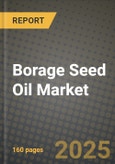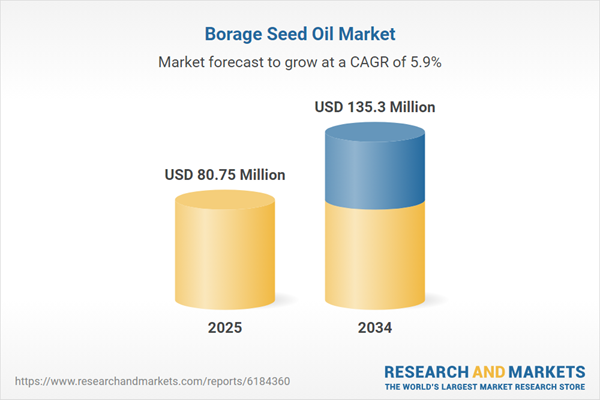Borage Seed Oil Market
Borage seed oil - prized for its high gamma-linolenic acid (GLA) content - has evolved from a niche botanical into a multi-industry functional ingredient spanning nutraceuticals, dermocosmetics, and specialty food applications. In supplements, it is positioned for women’s health, skin health, and inflammatory balance, with softgels and blended omega formulations as the dominant delivery formats. Personal care formulators use cold-pressed and refined grades in face oils, serums, and barrier-repair creams, often highlighting COSMOS/Ecocert, vegan, non-GMO, and allergen-free claims. In foods and beverages, demand is led by fortified gummies, functional shots, and medical nutrition, where microencapsulation and deodorization enable palatability without sacrificing GLA integrity. Key trends include a pivot to regenerative and traceable contract farming, supercritical CO₂ extraction for solvent-free positioning, standardized GLA assays for label accuracy, and clean-label actives paired with ceramides, squalane, and niacinamide in skincare. Growth is supported by the broader shift toward plant-based omegas and preventive health routines, while competition from evening primrose and black currant seed oils keeps pricing and claims in check. Supply is concentrated in temperate geographies with high-yield cultivars, making harvest variability and climate risk important cost drivers. The value chain is increasingly integrated: seed breeders, crushers, and specialty refiners partner with supplement and beauty brands for guaranteed specs, long-term offtake, and co-branded efficacy narratives. Regulatory expectations center on quality, purity (including alkaloid controls), and truthful marketing of GLA content, favoring manufacturers with robust QA, sustainability reporting, and clinically aligned positioning.Borage Seed Oil Market Key Insights
- GLA as the hero active: Purchasing decisions in both supplements and skincare hinge on verified GLA percentages and oxidative stability. Brands that publish third-party assays, use nitrogen-flushed packaging, and provide peroxide/anisidine indices build superior trust. Standardization (e.g., fixed GLA ranges) reduces batch-to-batch variability and underpins premium pricing across direct-to-consumer and practitioner channels.
- Delivery-format innovation: Softgels remain the workhorse, but microencapsulated powders enable gummies, sachets, and RTD shots; in cosmetics, lightweight esters and nanoemulsions enhance sensorials and penetration. Odor control via gentle deodorization and antioxidant systems (mixed tocopherols, rosemary extract) improves compliance and extends shelf life without compromising “natural” claims.
- Clean-label & sustainability edge: Cold-pressed, solvent-free, and organic variants gain preference, supported by farm-level traceability, biodiversity buffers, and low-input cultivation narratives. Certifications (vegan, cruelty-free, COSMOS) amplify brand stories. Suppliers with auditable scope-3 data and regenerative agronomy pilots emerge as preferred partners for global beauty and wellness portfolios.
- Women’s health & skin-barrier positioning: Evidence-aligned claims around PMS/menopause comfort, skin hydration, and barrier repair resonate with proactive wellness consumers. Cross-category bundling - combining borage with evening primrose, omega-3s, zinc, or ceramides - drives basket size and reduces single-ingredient substitution risk.
- Competitive set & substitution pressure: Evening primrose and black currant seed oils remain the nearest substitutes; price-value calculations revolve around GLA yield per dose, oxidative stability, and taste/odor profile. Blended “Omega-Complex” SKUs mute single-source volatility but intensify competition on cost-per-active and clinical storytelling.
- Quality & compliance as differentiators: Robust controls for contaminants and alkaloids, low FFA, and tight heavy-metal specs are non-negotiable for multinational buyers. Full CoAs, allergen statements, non-GMO attestations, and stability data shorten vendor approval cycles and enable faster line extensions into sensitive use-cases like medical nutrition and maternity care.
- Retail & route-to-market shifts: DTC and marketplace brands exploit rapid A/B testing on claims and formats, while legacy brands leverage pharmacy and practitioner endorsements. Private label is expanding in specialty retail, creating opportunities for white-label refiners with flexible MOQs, custom GLA specs, and design-to-brief capabilities.
- Pricing dynamics & risk management: Seed yields, climate variability, and agronomic inputs drive crude oil costs; refining losses, deodorization choices, and QA intensities influence finished-goods margins. Multi-origin sourcing, forward contracts, and hedging via blended omega portfolios are now routine to protect contribution margins.
- R&D pipeline in beauty & ingestibles: In skincare, pairing borage oil with post-biotic ferments and ceramide analogs underpins barrier-repair claims; in ingestibles, synergistic stacks (GLA + EPA/DHA or curcumin) target inflammation-adjacent benefits. Encapsulation tech improves bioavailability and taste masking, opening doors to new food formats.
- Partnership & consolidation trend: Strategic alliances between seed growers, specialty crushers, and branded wellness portfolios align agronomy with marketing calendars. M&A interest concentrates on suppliers offering origin transparency, organic acreage, solvent-free capacity, and turnkey regulatory dossiers for rapid international rollout.
Borage Seed Oil Market Reginal Analysis
North America:
Demand is anchored in women’s health, dermatology-adjacent wellness, and clean beauty. Retailers favor verified GLA content, allergen-free claims, and solvent-free processing. DTC brands drive education on omega balance and barrier repair, while practitioner lines emphasize assay transparency and stability data. Private label expansion and marketplace discoverability intensify competition, making QA, storytelling, and customer support decisive.Europe
A mature botanical-oils ecosystem supports organic, COSMOS-certified grades and sophisticated skincare formulations. Beauty brands prioritize eco-design, life-cycle transparency, and refillable packaging. Food supplement players lean on standardized GLA claims and multi-ingredient complexes. Seasonal harvest patterns and strict purity expectations reward suppliers with resilient agronomy, solvent-free refining, and comprehensive documentation.Asia-Pacific
APAC growth is propelled by dermocosmetics, K-beauty/J-beauty textures, and a rising preventive-health mindset. Formulators adopt lightweight, fast-absorbing systems and combine borage with ceramides, niacinamide, and hyaluronic acid. In supplements, gummies and sachets gain traction, supported by microencapsulation and taste-masking. Regional regulatory diversity elevates the value of suppliers offering localized compliance packs and flexible pack sizes.Middle East & Africa
Premium skincare and pharmacy-led supplements are the main entry points, with consumers seeking hydration and barrier-repair benefits suited to arid climates. Distribution relies on modern trade and pharmacy chains; education around GLA differentiates from generic plant oils. Importers favor partners with strong stability data, halal-friendly processing, and consistent sensory profiles to maintain repeat purchase.South & Central America
Adoption is led by specialty beauty retailers and practitioner-endorsed supplements, with growing interest in plant-based omegas. Currency swings and import logistics place a premium on reliable lead times, multi-origin sourcing, and blended formulations that optimize cost-per-GLA. Local brand builders seek turnkey private-label solutions - standardized specs, small MOQs, and ready-to-ship documentation to accelerate launches.Borage Seed Oil Market Segmentation
By Type
- Organic
- Regular
By Form
- Oil
- Capsules
- Gels
By End-User
- Pharmaceuticals
- Personal Care
- Food and Beverages
- Others
Key Market players
AOS Products Pvt. Ltd., Connoils LLC, Henry Lamotte Oils GmbH, Gustav Heess, Bioriginal, O&3, OLVEA Vegetable Oils, New Directions Aromatics, Naturallythinking, Mountain Rose Herbs, Icelandirect Inc., Aromex Industries, Desert Whale Jojoba Company, William Hodgson & Co., BO International.Borage Seed Oil Market Analytics
The report employs rigorous tools, including Porter’s Five Forces, value chain mapping, and scenario-based modelling, to assess supply-demand dynamics. Cross-sector influences from parent, derived, and substitute markets are evaluated to identify risks and opportunities. Trade and pricing analytics provide an up-to-date view of international flows, including leading exporters, importers, and regional price trends.Macroeconomic indicators, policy frameworks such as carbon pricing and energy security strategies, and evolving consumer behaviour are considered in forecasting scenarios. Recent deal flows, partnerships, and technology innovations are incorporated to assess their impact on future market performance.
Borage Seed Oil Market Competitive Intelligence
The competitive landscape is mapped through proprietary frameworks, profiling leading companies with details on business models, product portfolios, financial performance, and strategic initiatives. Key developments such as mergers & acquisitions, technology collaborations, investment inflows, and regional expansions are analyzed for their competitive impact. The report also identifies emerging players and innovative startups contributing to market disruption.Regional insights highlight the most promising investment destinations, regulatory landscapes, and evolving partnerships across energy and industrial corridors.
Countries Covered
- North America - Borage Seed Oil market data and outlook to 2034
- United States
- Canada
- Mexico
- Europe - Borage Seed Oil market data and outlook to 2034
- Germany
- United Kingdom
- France
- Italy
- Spain
- BeNeLux
- Russia
- Sweden
- Asia-Pacific - Borage Seed Oil market data and outlook to 2034
- China
- Japan
- India
- South Korea
- Australia
- Indonesia
- Malaysia
- Vietnam
- Middle East and Africa - Borage Seed Oil market data and outlook to 2034
- Saudi Arabia
- South Africa
- Iran
- UAE
- Egypt
- South and Central America - Borage Seed Oil market data and outlook to 2034
- Brazil
- Argentina
- Chile
- Peru
Research Methodology
This study combines primary inputs from industry experts across the Borage Seed Oil value chain with secondary data from associations, government publications, trade databases, and company disclosures. Proprietary modeling techniques, including data triangulation, statistical correlation, and scenario planning, are applied to deliver reliable market sizing and forecasting.Key Questions Addressed
- What is the current and forecast market size of the Borage Seed Oil industry at global, regional, and country levels?
- Which types, applications, and technologies present the highest growth potential?
- How are supply chains adapting to geopolitical and economic shocks?
- What role do policy frameworks, trade flows, and sustainability targets play in shaping demand?
- Who are the leading players, and how are their strategies evolving in the face of global uncertainty?
- Which regional “hotspots” and customer segments will outpace the market, and what go-to-market and partnership models best support entry and expansion?
- Where are the most investable opportunities - across technology roadmaps, sustainability-linked innovation, and M&A - and what is the best segment to invest over the next 3-5 years?
Your Key Takeaways from the Borage Seed Oil Market Report
- Global Borage Seed Oil market size and growth projections (CAGR), 2024-2034
- Impact of Russia-Ukraine, Israel-Palestine, and Hamas conflicts on Borage Seed Oil trade, costs, and supply chains
- Borage Seed Oil market size, share, and outlook across 5 regions and 27 countries, 2023-2034
- Borage Seed Oil market size, CAGR, and market share of key products, applications, and end-user verticals, 2023-2034
- Short- and long-term Borage Seed Oil market trends, drivers, restraints, and opportunities
- Porter’s Five Forces analysis, technological developments, and Borage Seed Oil supply chain analysis
- Borage Seed Oil trade analysis, Borage Seed Oil market price analysis, and Borage Seed Oil supply/demand dynamics
- Profiles of 5 leading companies - overview, key strategies, financials, and products
- Latest Borage Seed Oil market news and developments
Additional Support
With the purchase of this report, you will receive:- An updated PDF report and an MS Excel data workbook containing all market tables and figures for easy analysis.
- 7-day post-sale analyst support for clarifications and in-scope supplementary data, ensuring the deliverable aligns precisely with your requirements.
- Complimentary report update to incorporate the latest available data and the impact of recent market developments.
This product will be delivered within 1-3 business days.
Table of Contents
Companies Mentioned
- AOS Products Pvt. Ltd.
- Connoils LLC
- Henry Lamotte Oils GmbH
- Gustav Heess
- Bioriginal
- O&3
- OLVEA Vegetable Oils
- New Directions Aromatics
- Naturallythinking
- Mountain Rose Herbs
- Icelandirect Inc.
- Aromex Industries
- Desert Whale Jojoba Company
- William Hodgson & Co.
- BO International.
Table Information
| Report Attribute | Details |
|---|---|
| No. of Pages | 160 |
| Published | November 2025 |
| Forecast Period | 2025 - 2034 |
| Estimated Market Value ( USD | $ 80.75 Million |
| Forecasted Market Value ( USD | $ 135.3 Million |
| Compound Annual Growth Rate | 5.9% |
| Regions Covered | Global |
| No. of Companies Mentioned | 15 |









